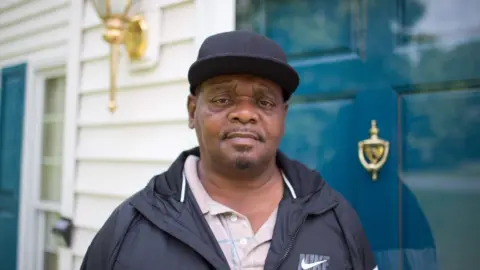Does a $75m settlement make up for three decades in prison?
 Emily Baxter
Emily BaxterA historic $75m (£53m) settlement awarded to two North Carolina brothers incarcerated for more than three decades over a crime they did not commit has brought the issue of wrongful convictions back into the limelight.
Henry McCollum and his half-brother Leon Brown were twice convicted for the 1983 rape and murder of an 11-year-old girl. In 2014, the emergence of new DNA evidence led to their exoneration and full pardons the following year.
On Friday, it was ruled that they receive $31m in damages each - $1m for every year spent in prison - and $13m in punitive damages. The payout represents the largest combined settlement in a wrongful conviction case in US history, according to the brothers' lawyers.
"I thank God," said Mr McCollum, in tears, as he left the courtroom with his brother, nearly seven years after a judge ordered the state to free them.
"There's still a lot of innocent people in prison today," Mr McCollum said. "And they don't deserve to be there."
What happened in this case?
On 24 September 1983, police in the small North Carolina town of Red Springs found the body of an 11-year-old girl in a soybean field.
The next day, acting on rumours from a classmate, they arrested Mr McCollum and Mr Brown, two African-American teenagers aged 19 and 15 respectively.
After several hours of interrogation with no lawyer present, officers reportedly coerced the duo into signing pre-written confessions implicating each other in the crime. Court documents stated the two brothers had cognitive difficulties and could barely read, write or understand what they were signing.
Both were sentenced to death. Mr Brown became North Carolina's youngest death row inmate, but was later resentenced to life in prison. Mr McCollum went on to become the state's longest serving inmate on death row.
No physical or forensic evidence ever connected either brother to the crime.
In 2014, DNA test results revealed the true perpetrator: Roscoe Artis, a convicted murderer serving life in prison on separate, yet similar, charges.
How common are wrongful convictions in the US?
The National Registry of Exonerations has recorded 2,784 people exonerated since it began collecting data in 1989.
More than half of all these cases have involved some form of prosecutorial or law enforcement misconduct. Nearly 50% of convicted defendants later found to be innocent have been African American.
The database also found that black people are seven times more likely to be wrongfully convicted of murder than white people.
Are large settlements common?
Wrongfully convicted Americans can file civil suits alleging their rights have been violated - but in some cases, plaintiffs end up with nothing.
It is particularly difficult to hold law enforcement officers accountable for misconduct, as their actions are largely protected under current US law.
But pressure to make police and other officials liable for their misdeeds is growing with recent racial justice movements. George Floyd's 2020 death in Minnesota led to a $27m settlement, and Breonna Taylor's in Kentucky saw a $12m payout.
Friday's judgment in North Carolina came after the two other law enforcement entities involved in the matter already settled with the brothers, for smaller amounts.
Jamie Lau, a Duke University law professor and expert on wrongful convictions in the state, says it is "significant" that a jury awarded the brothers $1m in compensatory damages, as it has expanded the likelihood of larger sums being awarded in the future.
But he warns that the massive dollar amount could also have the effect of pushing defendants to settle out of court rather than run the risk of a trial with major financial consequences.
How do US courts decide what one year in prison costs?
Thirty-six states and Washington DC currently have laws that call for providing compensation to the wrongfully convicted.
In North Carolina, exonerated people who are pardoned by the governor are eligible to receive $50,000 for each year they spent in prison. But total compensations cannot exceed $750,000.
That was how much Ronnie Long, a black man wrongfully incarcerated over a 1976 rape and burglary, received in restitution. His lawyer has argued that, by this calculation, Mr Long has only been compensated "for what amounts to 15 years" of his 44-year incarceration.
A civil court will decide if Mr Long will receive any further compensation for what is the third longest wrongful incarceration in the country.
Does the money help?
Monetary compensation can be a financial lifeline that allows those exonerated to secure basic necessities, affordable housing, legal services and whatever else helps get them back on their feet.
Prof Lau told the BBC of another client - Charles Finch - who served nearly 43 years on death row before being released in 2019, at the age of 81.
"He hasn't [yet] received a dime, either from the state statutory scheme or through civil litigation," says Prof Lau, who pointed out that Mr Finch is now too old to work and must rely on family and friends.
"Where we fail people who are wrongly convicted is in not providing them the resources they need as early as possible to help them get back on their feet," he adds. "All of the harms of the wrongful convictions persist in a way that's different but ongoing."
While the combined $62m in compensatory damages to the brothers is "an attempt to make them whole again after they lost so much", says Prof Lau, the additional $13m in punitive damages also "sends a message" that deceptive policing practices will no longer be accepted.
